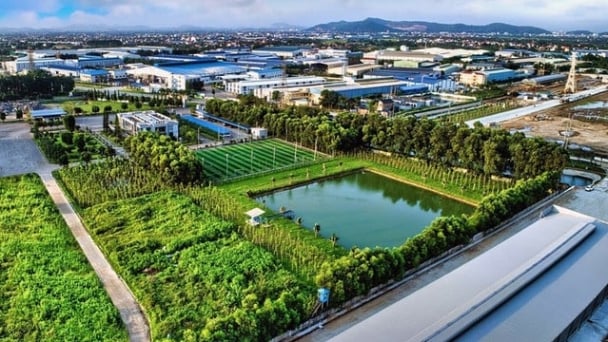September 25, 2025 | 09:11 GMT +7
September 25, 2025 | 09:11 GMT +7
Hotline: 0913.378.918
September 25, 2025 | 09:11 GMT +7
Hotline: 0913.378.918
On the afternoon of September 23 in Hanoi, the Vietnam Agriculture and Nature Newspaper, in collaboration with the Department of Environment and the Vietnam Beer, Alcohol, and Beverage Association (VBA), organized the seminar “Promoting effective and sustainable beverage packaging recycling in Vietnam.”

Mrs. Ly Thi Hong Diep, Deputy Editor-in-Chief of the Vietnam Agriculture and Nature Newspaper, hopes the seminar will generate practical initiatives and useful recommendations, contributing to pollution reduction and supporting the goals of Net Zero and a green, sustainable Vietnam. Photo: Mai Dan.
Ms. Ly Thi Hong Diep, Deputy Editor-in-Chief of the Vietnam Agriculture and Nature Newspaper, stated that Vietnam is developing rapidly, leading to a swift increase in solid waste, particularly beverage packaging. Managing, collecting, and recycling packaging has become an urgent challenge that requires the joint efforts of society as a whole.
The beverage industry not only contributes positively to the economy but also generates a large volume of packaging. Therefore, Extended Producer Responsibility (EPR) under the 2020 Environmental Protection Law is a mandatory obligation. Packaging recycling not only protects the environment but also creates opportunities to increase circular economic value and enhance corporate reputation and brand.
The seminar serves as a forum to assess the current state of beverage packaging collection, sorting, and recycling in Vietnam; share effective models and international experiences; discuss solutions to challenges in implementing EPR; and propose policies to promote a sustainable recycling ecosystem.
“We hope the seminar will generate practical initiatives and useful recommendations, contributing to pollution reduction and supporting the goals of Net Zero and a green, sustainable Vietnam,” emphasized Deputy Editor-in-Chief Ly Thi Hong Diep.

Mr. Ho Kien Trung, Deputy Director of the Department of Environment, believes that with determination and collaboration, a sustainable and environmentally friendly beverage industry can be built. Photo: Mai Dan.
According to Mr. Ho Kien Trung, Deputy Director of the Department of Environment, the beverage industry is currently one of the sectors generating the largest volume of packaging waste, from plastic bottles and aluminum cans to multilayer cartons. Without effective collection and recycling, this waste puts significant pressure on waste management systems and the environment.
In the context of Vietnam’s push for a circular economy and plastic waste reduction, promoting beverage packaging recycling is highly important. It not only conserves resources and reduces emissions but also provides recycled materials for new production, creating opportunities to enhance corporate reputation and sustainability.
The government has issued various policies to address this issue. From the 2005 and 2014 Environmental Protection Laws to the 2020 Law, responsibilities for recovering and managing discarded products have been clearly defined, concretized through the EPR mechanism. This is an effective tool to encourage beverage companies to proactively participate in product lifecycle management.
Addressing packaging waste requires the joint efforts of the government, businesses, and the community. Mr. Ho Kien Trung believes that with determination and cooperation, a sustainable and environmentally friendly beverage industry can be developed.

Ms. Chu Thi Van Anh, Vice Chairwoman and Secretary General of the Vietnam Beer, Alcohol, and Beverage Association, proposed several mechanisms and policies to promote beverage packaging recycling. Photo: Mai Dan.
Proposing mechanisms and policies to promote beverage packaging recycling, Ms. Chu Thi Van Anh, Vice Chairwoman and Secretary General of the Vietnam Beer, Alcohol, and Beverage Association, emphasized the need for policies that encourage the use of recycled plastic packaging (rPET); ensure that EPR costs are considered legitimate and deductible for tax purposes; and improve recycling infrastructure. She also highlighted the importance of a suitable roadmap when adjusting mandatory recycling rates, including limits on maximum increases.
Additionally, policies and mechanisms are needed to support the development of collection and recycling infrastructure and technology, as well as incentives for companies that both collect/recycle and use recycled packaging - such businesses should be partially exempt from upstream collection and recycling obligations.
According to Ms. Chu Thi Van Anh, the VBA and the Ministry of Agriculture and Environment will organize dedicated training sessions for beverage companies, coordinate forums for knowledge exchange during implementation to guide businesses and address challenges, and supplement notifications from authorities regarding the appraisal of company reporting, calculation, and fund contributions.
Ms. Van Anh emphasized that effective EPR requires coordinated participation from the entire society: the government; producers and importers; collection and recycling forces; consumers; and the media.

The seminar served as a forum to assess the current state of beverage packaging collection, sorting, and recycling in Vietnam, as well as to share effective models and international experiences. Photo: Mai Dan.
At the seminar, representatives from relevant agencies and organizations presented regulations on EPR for beverage packaging, as well as mechanisms and tools to promote packaging recycling. Notably, within the seminar framework, the roundtable discussion “Solutions to promote effective and sustainable beverage packaging recycling” drew significant interest and lively discussion among participants.
Translated by Phuong Linh

(VAN) If green transformation is a runway, then Vietnam's entire political system and its businesses are ready for takeoff, driven by a desire for global integration and development.

(VAN) Vietnam is entering a new phase of development, one where economic interests are intertwined with environmental benefits, and where people and nature coexist in harmony.

(VAN) Prime Minister Pham Minh Chinh has issued Directive No. 29/CT-TTg on the implementation of key tasks and solutions to promote exports.
/2025/09/23/0240-1-185057_229.jpg)
(VAN) Strengthening linkages with processing enterprises, improving breed quality, making use of by-products, and reorganizing production are key solutions to help farmer households feel secure in raising dairy cows.
/2025/09/23/0410-2-215854_152.jpg)
(VAN) In the working session with the Ministry of Agriculture and Environment and relevant localities, the Prime Minister emphasized that authorities cannot remain powerless against violations in seafood exploitation.

(VAN) Throughout 80 years of national development, science and technology, in line with supportive policies, have been the driving force behind the remarkable achievements of Vietnam's agriculture and environment sector.